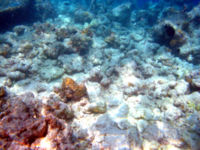Author and Page information
- This page: https://www.globalissues.org/article/173/coral-reefs.
- To print all information (e.g. expanded side notes, shows alternative links), use the print version:
On this page:
Coral Reefs: Ecosystems of Environmental and Human Value

Coral reefs cover an area of over 280,000 km2 and support thousands of species in what many describe as the rainforests of the seas
.
Coral reefs benefit the environment and people in numerous ways. For example, they
- Protect shores from the impact of waves and from storms;
- Provide benefits to humans in the form of food and medicine;
- Provide economic benefits to local communities from tourism.
Coral Reefs Are Dying Around the World
A report from the World Resources Institute (WRI) in 1998 suggested that as much as 60 percent of the earth’s coral reefs are threatened by human activity.
Scientists have said that as much as 95 percent of Jamaica’s reefs are dying or dead.
Global Threats to Coral Reefs
All around the world, much of the world’s marine biodiversity face threats from activities and events such as
- Coastal development;
- Overfishing;
- Inland pollution;
- Global climate change.
Climate change causing global mass coral bleaching


It is believed that almost all species of corals were affected by high sea surface temperatures during 1998 and the El Niño at the time, which resulted in global coral bleaching and mortality.
2002 was then the second worst year for coral bleaching after 1998.
Scientists have long been pessimistic about the future, with some reefs expected to vanish by 2020.
Additional scientific research, reported by Greenpeace fears climate change will eliminate reefs from many areas:
If climate change is not stopped, coral bleaching is set to steadily increase in frequency and intensity all over the world until it occurs annually by 2030—2070.
This would devastate coral reefs globally to such an extent that they could be eliminated from most areas of the world by 2100. Current estimates suggest that reefs could take hundreds of years to recover. The loss of these fragile ecosystems would cost billions of dollars in lost revenue from tourism and fishing industries, as well as damage to coastal regions that are currently protected by the coral reefs that line most tropical coastlines.
Legacy of Nuclear Tests
In 1995, France started testing it’s Nuclear weapons in the Pacific despite huge protests (though other nuclear nations that are often critical of other countries doing nuclear tests, such as Britain, did not criticize France). It is now emerging that the coral in the French Polynesia regions where many Nuclear tests have been carried out have been harmed, as the French atomic energy commission has admitted. This is raising concern over what else they may have failed to tell the people who have to live through it in that area.
More Information
For more information on coral reefs you could start at the following:
Author and Page Information
- Created:
- Last updated:

